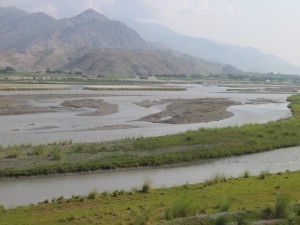Steven Pressfield's Blog, page 149
September 11, 2009
Knowing When to Stop, or Learning How to Win?
<!--StartFragment-->
A guest blog by Michael Brandon McClellan
[Mike McClellan is a graduate of Yale and Georgetown Law and a Lincoln Fellow at the Claremont Institute. His articles on politics and foreign policy have appeared in the WSJ, the Weekly Standard and on TCS Daily. It's our pleasure to welcome him as a contributor.:]
A few months ago I sat in awe in a Santa Monica hotel ballroom. George Will had been speaking for an hour and still held the audience spellbound. In a relaxed conversational tone, he...
September 9, 2009
Writing Wednesdays #7: Personal Anguish
<!--StartFragment-->
Have you seen Elizabeth Gilbert at TED? The video has become a bit of a sensation on the web and if you watch it, you'll see why. Ms. Gilbert is the author of Eat, Pray, Love. TED stands for Technology, Entertainment, Design; it's a nonprofit organization that brings together speakers from the arts and sciences and politics several times a year. Ms. Gilbert's talk was a hit at the most recent get-together.
She was talking about the enormous and unexpected (to her) success of Eat, Pray, Love
September 7, 2009
Previews of Coming Attractions
<!--StartFragment-->
Three items will be coming up this week (and in the following weeks) in this space that I think will be extremely interesting and provocative. I can say that with confidence because none of them will be coming from me.
First, in the next day or two, we'll post a response from Michael McClellan to George Will's recent "This Week" comments and Washington Post column. Mike is an extremely thoughtful and articulate young lawyer and Lincoln Fellow at the Claremont Institute. I don't know what...
September 2, 2009
"Writing Wednesdays" #2: The Most Important Writing Lesson I Ever Learned
<!--StartFragment-->
[Our blog is on vacation over Labor Day. Here's a re-run of a favored Writing Wednesdays piece. See you next week!:]
My first real job was in advertising. I worked as a copywriter for an agency called Benton & Bowles in New York City. An artist or entrepreneur's first job inevitably bends the twig. It shapes who you'll become. If your freshman outing is in journalism, your brain gets tattooed (in a good way) with who-what-where-when-why, fact-check-everything, never-bury-the-lead. If you...
August 31, 2009
Gifts of Honor: A Tale of Two Captains

Mangwel and the Konar River Valley
[Our blog is on vacation over Labor Day. Here's a "re-run" of a favored post from a couple of months ago. See you next week!:]
June 22nd, the Washington Post ran an excellent article by Greg Jaffe, titled "A Personal Touch in Taliban Fight." The piece is about a young Army captain, Michael Harrison, and his up-close-and-personal work as a company commander in the remote tribal villages of the Konar River valley in Afghanistan.
Flashback to 2003, same valley, sam
August 26, 2009
"Writing Wednesdays" #2: The Most Important Writing Lesson I Ever Learned
[Our blog is on vacation over Labor Day. Here's a re-run of a favored Writing Wednesdays piece. See you next week!:]
My first real job was in advertising. I worked as a copywriter for an agency called Benton & Bowles in New York City. An artist or entrepreneur's first job inevitably bends the twig. It shapes who you'll become. If your freshman outing is in journalism, your brain gets tattooed (in a good way) with who-what-where-when-why, fact-check-everything, never-bury-the-lead. If you...
Writing Wednesdays #6: Write What You Don't Know
<!--StartFragment-->
Probably the most classic kernel of writing advice is "Write What You Know." On the surface, that seems to make a lot of sense, and I'm sure it has worked for thousands and thousands of writers. It didn't work for me.
When I was a beginning writer I had two literary heroes: Jack Kerouac and Ernest Hemingway. A lot of aspiring writers in my era had those guys as heroes. Kerouac and Hemingway weren't so much my heroes for what they wrote (though that was a big part of it); it was more the ethic und
Writing Wednesdays #6: Write What You Don't Kow
<!--StartFragment-->
Probably the most classic kernel of writing advice is "Write What You Know." On the surface, that seems to make a lot of sense, and I'm sure it has worked for thousands and thousands of writers. It didn't work for me.
When I was a beginning writer I had two literary heroes: Jack Kerouac and Ernest Hemingway. A lot of aspiring writers in my era had those guys as heroes. Kerouac and Hemingway weren't so much my heroes for what they wrote (though that was a big part of it); it was more the ethic und
August 24, 2009
In Defense of Hamid Karzai
<!--StartFragment-->
Discussion of the problems created by tribalism in Afghanistan often provokes from our own compatriots such outraged responses as, "Hey, who are we Americans to talk? We have our share of tribes too!" There's no arguing with that. Here at home we've got the Bible-thumping cracker tribe, the latte-sipping liberal tribe and dozens more, all of which have to be catered to by the political process. To me though, the most useful American parallel to Afghan tribalism goes back to 1491—before the first
August 21, 2009
Weekend Mashup—August 21 to 23
This past week, the New York Times ran the op-ed "The Land of 10,000 Wars" by Ganesh Sitaraman. Hard to resist the urge to post the entire op-ed here. Check it out if you haven't read it already.
The challenge for General McChrystal is creating a comprehensive and integrated strategy for Afghanistan out of the hundreds, if not thousands, of peoples, identities, and conflicts in the country.
This next quote from Sitaraman's op-ed reminds me of the work of then-Captain Jim Gant and Captain Micha



